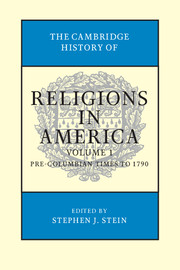Book contents
- Frontmatter
- Contents
- Contributors
- Editor's Introduction
- SECTION I BACKGROUND ON RELIGIOUS TRADITIONS – PRE-1500S
- SECTION II RELIGIONS IN THE POST-COLUMBIAN NEW WORLD – 1500–1680S
- SECTION III RELIGIOUS PATTERNS IN COLONIAL AMERICA – 1680S–1730S
- 12 Spanish Catholicism in the Caribbean, New Spain, and the Northern Frontiers
- 13 French Catholicism in New France
- 14 Congregationalist Hegemony in New England, from the 1680s to the 1730s
- 15 The Middle Colonies, 1680–1730
- 16 Religion in the Southern English Colonies, 1680s–1730s
- SECTION IV RELIGIOUS DIVERSITY IN BRITISH AMERICA – 1730S–1790
- SECTION V AMERICAN RELIGIONS IN THE EIGHTEENTH-CENTURY INTERNATIONAL CONTEXT
- SECTION VI THEMATIC ESSAYS
- Index
- References
14 - Congregationalist Hegemony in New England, from the 1680s to the 1730s
from SECTION III - RELIGIOUS PATTERNS IN COLONIAL AMERICA – 1680S–1730S
Published online by Cambridge University Press: 28 July 2012
- Frontmatter
- Contents
- Contributors
- Editor's Introduction
- SECTION I BACKGROUND ON RELIGIOUS TRADITIONS – PRE-1500S
- SECTION II RELIGIONS IN THE POST-COLUMBIAN NEW WORLD – 1500–1680S
- SECTION III RELIGIOUS PATTERNS IN COLONIAL AMERICA – 1680S–1730S
- 12 Spanish Catholicism in the Caribbean, New Spain, and the Northern Frontiers
- 13 French Catholicism in New France
- 14 Congregationalist Hegemony in New England, from the 1680s to the 1730s
- 15 The Middle Colonies, 1680–1730
- 16 Religion in the Southern English Colonies, 1680s–1730s
- SECTION IV RELIGIOUS DIVERSITY IN BRITISH AMERICA – 1730S–1790
- SECTION V AMERICAN RELIGIONS IN THE EIGHTEENTH-CENTURY INTERNATIONAL CONTEXT
- SECTION VI THEMATIC ESSAYS
- Index
- References
Summary
The founders of New England's Congregationalism in the 1630s had an ambitious agenda. Their churches would be islands of sectarian purity, each one covenanted with God and restricted in adult membership to people testifying to conversion. Power in each church would be shared between ministers and laity; each church would police its members with strict communal discipline, and the churches would be united voluntarily, not coercively. The churches would work closely with the secular authorities, all church members, who would protect the churches' religious monopoly, morally supervise the general population through strict laws, and see that the region's youth were indoctrinated. Success in this hegemonic project would bring God's blessings on New England; failure would bring his wrath.
By the start of the 1680s, signs of God's wrath were mounting: crop failure, a devastating Indian war, the irrepressibility of Baptists and Quakers, and in 1684 the most severe punishment of all. Massachusetts' charter, which for half a century had allowed the heartland of Congregationalism to act virtually independently of the English government, was vacated in an English court. There was no barrier between Massachusetts and King Charles II, increasingly authoritarian and increasingly hostile to the Nonconformist heirs of the Puritans. The situation ominously resembled the one that had driven the Puritans to New England initially, and it grew even worse when James II, an open Catholic with an even more expansive understanding of the monarchy's powers, assumed the throne in 1685.
- Type
- Chapter
- Information
- The Cambridge History of Religions in America , pp. 282 - 302Publisher: Cambridge University PressPrint publication year: 2000

